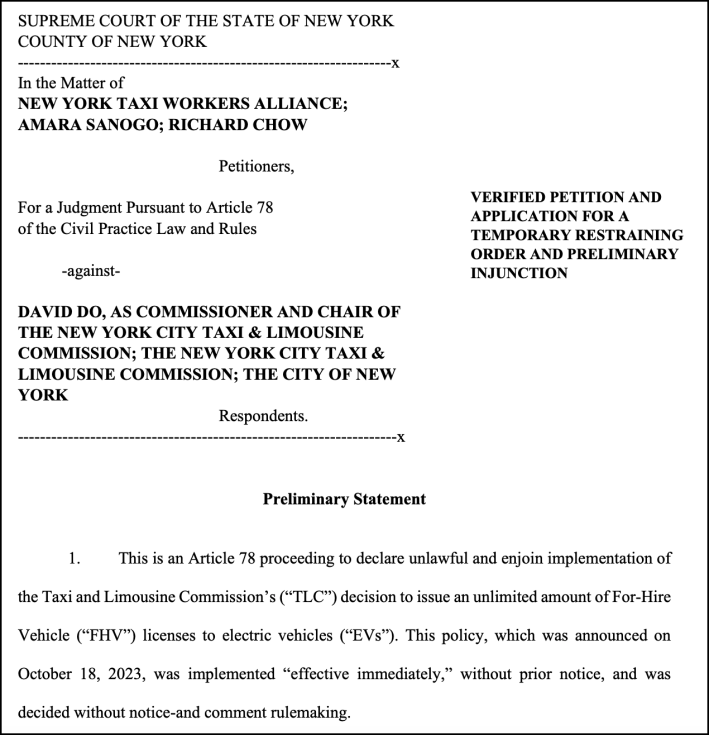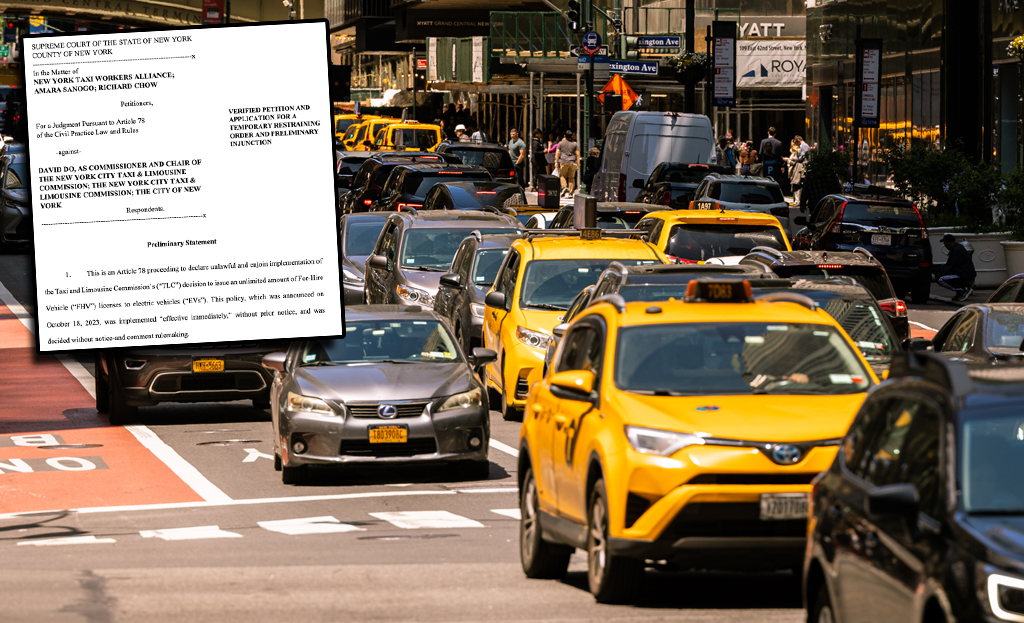Mayor Adams's plan to add an unlimited number of new electric Ubers and Lyfts to New York City streets will compound congestion, pollution and traffic violence — which the Taxi and Limousine Commission must be forced to study before the onslaught, taxi workers charged in court on Manhattan Supreme Court late last week.
The TLC and Mayor Adams failed to do the proper due diligence before their announcement last month to exempt e-vehicles from a de Blasio-era cap on app-based taxis that had been enacted to alleviate gridlock and improve driver wages, the suit from New York Taxi Workers Alliance charges.

The suit's heft comes from new analysis by transportation economist and traffic expert Charles Komanoff, who wrote in an affidavit that there will be "considerable impacts" of the new e-vehicles about which the TLC has done "no analysis, modeling or other material reflecting."
"Perhaps the commission imagined that the public wouldn't notice," Komanoff added, but the effect "will be anything but benign."
Just 5,000 more app-based taxis would cause more congestion, more traffic deaths and more pollution, even if the vehicles run on electricity, according to Komanoff's analysis. The analysis relied on Komanoff's "Balanced Transportation Analyzer," an essential tool for understanding traffic movements based on any changes, such as more vehicles or different tolling, among other inputs. Also, the city's electrical grid relies almost entirely on fossil fuels, as Streetsblog previously reported.
Beyond the new congestion — which Komanoff says would cost $200 million in lost worker productivity — Komanoff's affidavit also raised the specter of increased emissions from "upstream" energy sources for electric cars and their batteries, increased traffic injuries, increased noise and "other socially hostile vehicular impacts" from the new cars.
It all adds up to $300 million in annual societal cost, Komanoff said.
Given that potential impact, officials should have conducted an environmental review before creating the new e-vehicle exemption, the New York Taxi Workers Alliance's lawsuit charged.
The de Blasio administration capped the number of non-EV Ubers and Lyfts in the city in 2018 amid a rash of studies showing the introduction of Uber in 2013 and subsequent industry growth had depressed wages and exacerbated traffic congestion.
TLC rules previously also allowed an e-vehicle exemption from 2019 to 2021 — a policy that officials only ended through city's usual "notice-and-comment rulemaking" process, the suit noted.
"The so-called 'reinstatement' was effected without the rulemaking process by which the initial rule and exemption was adopted and without the rulemaking process by which the exemption was eliminated," plaintiffs wrote.
"Instead, the TLC has reinstated the EV exemption rule’s uniform policy by administrative fiat, with no prior notice, and without rulemaking, in a surprisingly brazen violation of the City Administrative Procedure Act and even TLC’s own rules."
Officials nixed the previous, short-lived e-vehicle exemption in 2021 after the mobility company Revel used it to dramatically expand its fleet in the city. City policy toward EVs has since shifted: TLC last month required that full electrification of Ubers and Lyfts by 2030.
With no cap on new EVs, drivers will be able to register new app-linked cabs "for the foreseeable future," officials said last month. That will effectively allow scores, hundreds or even thousands of new TLC-licensed cars on the road, though officials don't foresee that big a boom, given how difficult it remains to charge electric cars currently.
Indeed, last week, TLC Press Secretary Jason Kersten told Streetsblog that the very first EV app-based cab had been approved, with just three more awaiting approval — hardly a land rush.
Kersten highlighted the Adams administration's position that EVs will allow drivers to abandon predatory leasing deals.
“The driver [of the approved EV] told us that he and his dad had been leasing a gas-guzzling TLC-plated SUV for $900 a week. They’re now paying $400 a week for a Model Y and own their own business,” he said.
He also pointed out that there are 25,000 fewer TLC-regulated vehicles operating right now — a result of the pandemic, the medallion industry collapse (due in part to the arrival of Uber and Lyft) and municipal mismanagement, Komanoff told Streetsblog. The added congestion from just 5,000 new EVs would cut the number of yellow cab trips by 1.5 percent, Komanoff said.
"With EVs becoming the dominant mandated option in the industry, the lifting of the cap on EV [app-based taxi] licenses is, in reality, the lifting of any meaningful license limitation," the New York Taxi Workers Alliance said in its suit.
The taxi driver group echoed Komanoff's charge that city officials failed to study the potential impacts of the new policy — which the suit calls "a return to the city’s laissez-faire attitude of the previous decade, when an ever-growing pool of drivers was left competing for a finite amount of fares."






